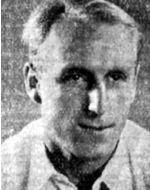Yehieli, Eliyahu (Eli)
Son of Mirel and Yehiel, was born on the first day of the intermediate days of Pesach, April 24, 2121 in the city of Chjanov, Galicia, Poland. Old son to his parents, a family of rabbis. When he was a year old, he was taken from his father. He studied in a “cheder” and a “yeshiva” and in a general elementary school. He continued to study at home and was enrolled as an external student in a government gymnasium in the city of Krakow. On the eve of the Second World War, he passed his matriculation exams. He was a member of the Communist Party and at the outbreak of the war left his town and fled to Lvov, which was then part of the Russian zone. He was temporarily engaged in painting posters. Out of concern for his mother’s fate, he secretly returned to the Nazi occupation zone. Tried to help her, but was forced to cross the border again. In this escape, he was caught by the Russians and transferred from one prison to another. His trial was held in Kharkov and he was sentenced to five years of hard labor on the White Sea. The detainees were employed in leaving railway tracks under harsh conditions, and he was able to withstand them only thanks to his strong body structure. With the entry of Russia into the war, the liberation of Polish subjects and the establishment of a Polish army after the Stalin-Sikorski agreement, Anders enlisted in the army and encountered severe anti-Semitism. Eliyahu served in an anti-tank company. He then completed a general paramedics course with honors and became the chief assistant of the doctor who discovered “supreme medical talent”. With the Polish army he left Russia and through the Caspian Sea, arrived in Falahby in Iran and from there to the company, the base of the company. He toured the excavation sites and became interested in archeology. In the autumn of 1943, Anders arrived in Eretz Israel in the Gaza Strip and went on a tour of the country and the Transjordan. In Israel he met with his sister and brother-in-law, who miraculously survived the death camps in Europe. Eliyahu deserted from the Polish army and joined Kibbutz Maagan. Later he left the kibbutz that he liked to continue his studies and moved to Jerusalem. He managed to take the matriculation examinations again and was accepted to the university, to the Faculty of Jewish Studies and Archeology. He enlisted in the Nutras in order to link his service to the Hagana and continue his studies. His base was at the Notrim station in Hadassah Hospital near the university. In October 1947 he married Miriam Skora. On the day of the United Nations General Assembly resolution on the partition of the country into two states, the Jewish Agency was invited to conduct a seminar on the knowledge of the country in Tel Aviv, And in February 1948 he became an intelligence officer in the fifth district of the city and took part in the planning of the operations, especially on the eve of the British exodus, and was in the successful planning of the capture of the Russian Compound On May 25, 1948, Was killed on the street and killed on the spot, was buried in Sheik Badar A. On September 10, 1950, he was transferred to the eternal rest of his grave Military service at Mount Herzl in Jerusalem.
